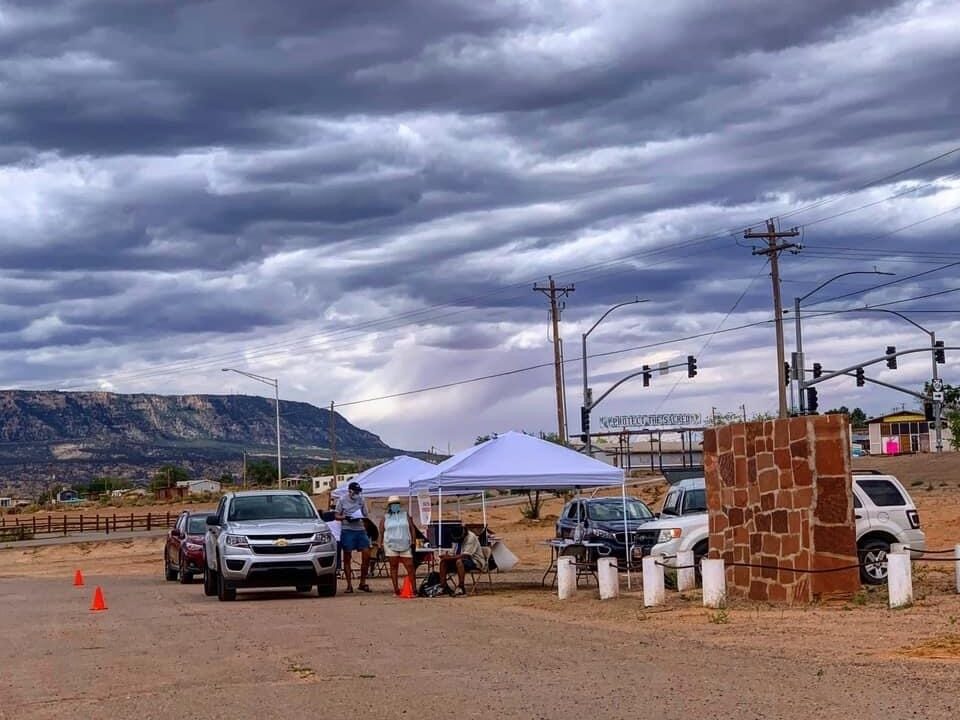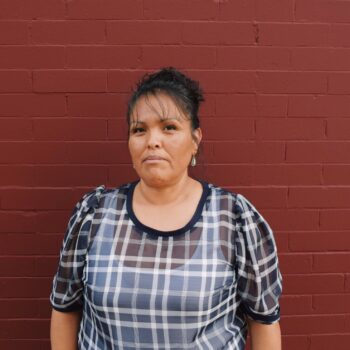Yá’át’ééh friends, my name is Tara Benally. I am of Hopi descent, but my family was raised by Navajo and I grew up in San Juan County, Utah. My family was raised by the Diné Bítahníí clan (folded arms people), born for the Nítłachíí (marks on the cheek people). Since 2018, I’ve served as the Field Director for the Rural Utah Project, working to register and turn out voters in the Navajo Nation.
Over the last two years, we’ve encountered a number of challenges in registering people to vote: lack of internet access, no physical addresses, and hard-to-reach households. Nothing could have prepared us, however, for the challenges that COVID-19 has created for our organizing program. Over the course of the last few months, COVID-19 has shown us exactly what our programs are made of: where they are strong and where we and so many organizations that work in voter registration need to grow and improve.
Our inability to have intimate conversations with voters on the Navajo Nation is the greatest daily struggle of our program during COVID. We’ve learned firsthand the importance of educational outreach in registration programs. Our efforts in Native Nations will flounder without it.
Here in Arizona, I’m working with a field team of seven organizers to run in-person, drive-through voter registration events across the Navajo Nation in a critical election year.
Most days, I wake up at 3:30 a.m., load up my stuff at 4:30 a.m., and am on the road by 5:00 a.m. to get to our registration events, which are easily two hours away. We’ve been running drive-through voter registration events here in Arizona — often in one hundred degree heat. We offer free popsicles to encourage people to come see what our table is all about. We set up at shopping centers and in chapter houses, which serve as the administrative and meeting houses for local government here on the 110 chapters of the Navajo Nation.
A good number have been coming up to our tables to check their voter registration status and find out more information. We’ve been meeting new people and new faces, introducing our clans and who we are.
A few days ago, another organizer, Janice, and I were in the Rough Rock community. A gentleman approached us and, like most Navajos, we introduced our clans. He said, “I’m born for the red mark on his cheek,” to which I responded, “You must be my father! Where have you been, Dad!” We laughed, and he told me: “A lot of people have been asking me that in my life.”
We’re meeting new family members out here, regardless of where we go. When on Navajo, we’re constantly reminded that people are willing to open up with kinship and respect.
On this campaign, there have been days that are rewarding and days that are discouraging. There are people telling us that we can’t do the things we set out to accomplish, but we’re working with our friends and partners to make them happen. There are breaks in communication, there are enormous challenges to the wellbeing of our people, but we’re working every day to educate each other on the issues ahead and how we will overcome them. COVID-19 has shown us that when systems fail, it is up to us to create solutions for the problems that we face. Both on our organizing team and in the people we are speaking to, we are seeing firsthand the resilience of our communities. As the voter registration deadline approaches, I’m proud to wake up each morning and get on the road to meet new people and continue this good work.
If there’s one thing I’ve learned over the past few months, it’s this: registering voters is not the greatest challenge that we face. We can use every creative tool and tactic out there to reach people and to register them, but these programs mean nothing if we do not also educate voters on why voting is only a small piece of participating in a democratic process. Voting is a tool, but it is not the only solution. Organizations often jump into the technical side of voter registration, especially as the pandemic rages. The question we should be asking is: how are we going to continue to listen to people and educate them on the importance of the Navajo Nation being a well-organized and engaged nation?
What it means to advance a community is so much more than the number of voter registration forms that we collect and the number of conversations that we have on the doors. How can we expect a single voter registration form to be the answer to generations of trauma and distrust of the U.S. government? The truth is simple: we cannot expect it to be the solution. We need a stronger, long-term program, focused on education instead of registration, to fill the gaps.
We, as Navajo people, are already well-organized. We look after each other, and we have the capacity to advance ourselves. When we vote, we do not vote as individuals but as a well-organized society. We show up to the polls as a demonstration of our resilience. Navjos will not vote in large numbers to advance one candidate; this will only happen when we have conversations about why participation is good for our people as a whole.
This work goes beyond one election, one strategy, and one year. But we are committed to seeing it through. Voting is a piece of the broader puzzle of civic engagement, and I wouldn’t wake up at 3:30 a.m. and drive hundreds of miles if it wasn’t worth it. Every year that the Rural Utah Project has worked on the Navajo Nation, we do more and more to create a program that goes beyond serving one electoral goal and instead brings more voters into the fold for a lifetime. We are not organizing for a campaign but for a movement.
That’s why, when we encounter barriers to registering voters, such as a lack of physical addresses, we create multi-year campaigns to solve the issue. We develop a program that creates addresses. When we can’t find an existing tool to register voters offline, we create one. This is the long-term thinking that our communities need, and we’re committed to seeing it through. COVID has removed some of the tools in our toolbox, but maybe that’s for the better. It forces us to create new systems and examine the ones that we currently use.
It is an honor to do this work on both the Utah and Arizona portions of the Navajo Nation. Thank you for supporting the critical work ahead.
Read the entire issue on Organizing in Rural America.

